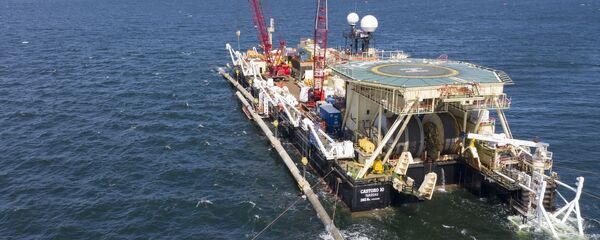The German chancellor's spokeswoman said that Angela Merkel shares the position of her Foreign Minister Heiko Maas in regards to the possibility of Berlin imposing sanctions against the Nord Stream 2 pipeline over the unconfirmed allegations of Moscow's role in the poisoning of opposition figure Alexei Navalny. The spokeswoman added that it is still too early to take any actions against Russia over the purported poisoning.
Maas stated earlier, on 6 September, that sanctions against Nord Stream 2, a joint venture of Gazprom and a number of European energy companies, including German ones, have not been ruled out. However, he stressed that the introduction of them would depend on Moscow's reaction to the accusations of poisoning. The minister also expressed hope that Russia would not "force" Germany to change its position in regards to the Nord Stream 2 project, which Merkel has defended in the past as purely economic and not political.
Another German official, a former candidate for succeeding Merkel as chancellor, Defence Minister Annegret Kramp-Karrenbauer, expressed a similar position towards Nord Stream 2 sanctions. She added, however, that she has always said is "not fond of" the project.
Accusations of Alleged Poisoning of Navalny
The opposition figure, Navalny, fell gravely ill on board a domestic flight on 20 August and was rushed to a hospital in Omsk after the plane made an emergency landing. After running a series of tests on the activist, who fell into a coma, the doctors ruled out the poisoning theory that was being pushed hard by his spokesperson, and suggested that the patient had suffered from a sudden drop in glucose levels caused by metabolism issues.
After 44 hours of fighting for the activist's life, medics managed to stabilise his condition and allowed his relatives to have him transported to a hospital in Germany. After Navalny spent more than a week there without any significant improvement, German authorities announced that the activist's blood tests suggested that he could have been poisoned by a military-grade Soviet-era nerve agent from the Novichok group, and accused Moscow of involvement in the incident. Chancellor Merkel requested that the Kremlin explain the situation, vowing to act according to Moscow's response.

Russia has refused to comment on the alleged poisoning, which was not confirmed by the Russian doctors, until Berlin passes over its materials proving that Navalny came in contact with a Novichok nerve agent. Germany, in turn, said that passing over the documents might take some time, without explaining the reasons why, but once again pushed the Kremlin for a response.
Despite the German authorities' claims that Navalny was poisoned by a military-grade nerve agent, the activist was taken out of coma on 7 September. According to the doctors, the opposition figure was responding to verbal stimuli, but they noted it was too early to speak about the long-term implications of his condition.




